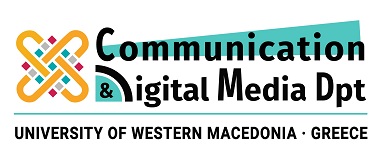CDM 4125 RESEARCH IN COMMUNICATION METHODOLOGY I
LEVEL OF STUDY: UNDERGRADUATE
COURSE UNIT CODE: CDM 4125
SEMESTER: 4th
COURSE TITLE: RESEARCH IN COMMUNICATION METHODOLOGY I
TEACHING WEEKLY HOURS: 3 H/W LECTURES
ECTS: 5
COURSE TYPE: CORE COMPULSORY
PREREQUISITES: Statistics for Social Sciences
TEACHING AND EXAM LANGUAGE: GREEK
COURSE DELIVERY TO ERASMUS STUDENTS: YES (in English)
This module introduces students to the main methodological approaches of social research so that they can use them to design and conduct small-scale empirical studies. All humans have a natural desire to explore the world in which they live to gain a deeper understanding of it. Careful observation (i.e. study) of the social world is not an exclusive undertaking of professional researchers, but a spontaneous activity of each one of us. What this module does is to present some tried, tested, and officially recognized ways of conducting a more conscious and systematic process of researching the social environment.
Firstly, the difference between research and other forms of acquiring knowledge is explained. The module then discusses the philosophical differences of quantitative and qualitative research and the ontological and epistemological assumptions that underlie them. Thirdly, the basic types of quantitative (e.g. cross-sectional surveys) and qualitative (e.g. ethnographic studies) research are discussed together with their respective data collection and analysis techniques. Mixed-multimethod approaches are also outlined. Students learn the steps that need to be followed to design and carry out a research project, from the formulation of research questions to the writing up and dissemination of results. Special attention is paid to research ethics and to issues of feasibility. Apart from traditional methods, new practices are also presented, such as the use of the internet in social research and visual analysis.
The module is organized into 3-hour teaching sessions during which theory is initially presented, followed by practical activities and exercises. The module draws on different topics and fields of study, such as communication, public relations, education, family, childhood, politics and governance, interpersonal relationships, mental health, equity and justice, immigration, organisational management, etc.
Upon successful completion of the module, students will be able to:
- Compare and contrast the different methods of quantitative and qualitative research.
- Evaluate the appropriateness of different methods for answering specific research questions.
- Conduct a synthesis of findings of previous research studies.
- Design small-scale quantitative and qualitative studies.
- Combine quantitative and qualitative methods in a mixed methods design.
- Construct and use varied tools to collect primary data (both quantitative and qualitative).
- Carry out a simple analysis of qualitative data and present the results.
- Critically discuss and interpret the results of quantitative and qualitative studies.
- Assess the validity and reliability of a study.
- Use research results to make decisions regarding social problems.
